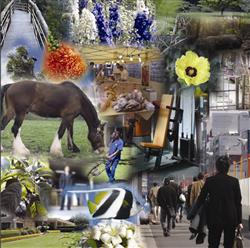
Study, Learn and Work in Applied Biological Science
- Open Learning Course -flexible, self paced
- Lots of options to specialize
- Start with a single module if you prefer, then transfer into this more extensive learning program after you are sure this is where you want to study
- Opportunity for personal mentoring from international experts based in both Australia and the UK -providing a unique international flavour to your education
- This course can open opportunities to work in land based or health industries; perhaps in marketing, media, consulting or management; or maybe in support of service providers, education or something else.
- Alone this course might not qualify you as a doctor, but most people who work in the health industry are not doctors. This is an excellent first step toward a career in Biology.
Course Duration:
- 900 hours
- Most students spread this over between 2 and 3 years; but some fast track studies and complete it faster, while others take longer.
- Take a break whenever you need it for a few weeks, or a few months. We are very flexible, and keen to provide an education that fits with the student's other commitments
COURSE STRUCTURE
Compulsory Modules
- Cell Biology
- Biochemistry I
- Animal Anatomy and Physiology or Human Anatomy and Physiology (one of these, but not both)
- Botany I
- Research Project I
- Workshop I
Elective Modules
Three more modules chosen from:
- Professional Practice for Consultants
- Technical Writing
- Freelance Writing
- Starting a Small Business
- Microbiology
- Environmental Chemistry
- Biochemistry II
- Biochemistry III
- Medical Terminology
- Physiology II (Human)
- Anatomy II (Human)
- Cardiorespiratory Endurance
- Botany II
- Plant Breeding
- Plant Ecology
- Project Management
- Horticulture I
- Horticulture II
- Marine Studies I
- Marine Studies II
- Vertebrate Zoology
- Invertebrate Zoology
- Wildlife Management
- Environmental Assessment
- Ornithology
- Animal Health
- Animal Feed and Nutrition
- Animal Breeding
- Research Project II
- Research Project III
- Workshop II
- Workshop III
Other relevant modules selected from Horticulture, Environmental, Agriculture, Science or Health and Fitness may also be considered..
(Note: other options are added every year, and further options will become available as you proceed through this course)

Opportunities
Biological science underpins more jobs today than one might imagine.
Industries as diverse as health services and psychology, through to food processing, agriculture, horticulture and environmental management; all depend upon a knowledge of biological science.
It is difficult to predict the jobs of the future with any precise detail; but given the speed with which new scientific discoveries are being made and applied to all of these industries; there is no doubt that a sound understanding of biological science will benefit anyone who develops it.
This is a course designed to give you a broad based foundation in science; and in doing so, lay the groundwork for taking up future opportunities whether as an employee or a business owner.
HOW DOES STUDY GET YOU WORK?
Although doing a course may not guarantee you work – it will set you apart from those that have not studied at all and it will improve your personal choices when applying for jobs or give you and your clients more confidence in you if you are looking to set up your own business.
When it comes to applying for jobs - each job listed usually gets a huge amount of response, when employers choose people to interview they will look at a range of factors, what you have studied will be just one of those factors. You need to be able to catch a potential employer’s attention and stand out from the rest.
So what do you need?
- Great communication skills: verbal, written and also the ability to use a computer. Whenever we are offering people a service (such as personal training for example) they are looking for someone with a professional approach and who instills a feeling of confidence.
- Problem solving skills: no matter what profession you work in you need to be able to problem solve – in personal training this is important so that you can construct programs to suit each individual. ACS courses are based on developing problem solving skills and you do this through your set tasks and assignments throughout the course.
- Knowledge and skills demanded of the job. In any job that involves people’s health and fitness you must know what you are doing – this is something you cannot do without the correct skills and knowledge and the only way to get this is by undertaking a course and gaining personal experience.
- A passion for the work and willingness to learn.
- Presentation and grooming - people who present as being well organised and well-groomed will impress.
How Will A Course Help Me To Gain those Skills?
Choosing the right course will help i.e. one that develops knowledge, practical and also your problem solving skills. Not all courses do this. At ACS our courses focus on Problem Based Learning so this enables the student to develop these skills and at the same time using this learning method also improves you knowledge retention and recall.
What Can You do to Improve Your Career Prospects?
- Choose a course that you are passionate about – be open to learning and use this course to start building your future. Today we are expected to keep learning and studying in order to keep up with a world that is rapidly changing. Learning is a lifelong experience. Study a course that makes you stand out - a study program that is different to all the other applicants will always catch the attention of a boss, and may be the difference between getting an interview or not.
- Network with people in the industry, attend conferences and trade shows – make yourself known to people in the industry in general.
- Try to build a range of skills – multi-skilled people catch the eye of the employer or potential employer.
- Write a good CV and ask for help if you need it. Tutors at this school will help our students with their C.V.'s if you ask -no cost. Resume Writing services can also be used, but they charge.
- Recognise your weaknesses and work on improving them - not just academically. And also know your strengths and demonstrate them.